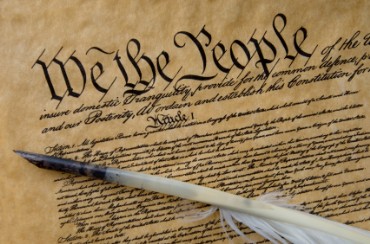
Two-hundred and 25 years ago, Virginia stood at the forefront of a national discussion about the future of the country.Today, more than two centuries after the signing of the United States Constitution, the Old Dominion could once again prominently shape the future political direction of the nation.
Virginia’s role in the 2012 presidential election was that of key swing state long before Mitt Romney claimed the Republican nomination, but its emergence this year as an important piece in the path to the White House harkens back to a time when the commonwealth helped guide America’s political destiny.
“Many of the stars aligned in order to ensure that Virginia had a large and justifiably important voice in governance,” said Doug Smith, executive director of the Center for the Constitution at James Madison’s Montpelier in Orange. “It shouldn’t surprise us that Virginia continues to play an important role on the scape of American politics. Virginia has a long, long history of being a leader and setting the governance direction.”
In 1787, delegates from the young nation’s 12 states gathered in Philadelphia to design a more effective government after the Articles of Confederation failed to resolve a number of lingering issues challenging the United States.
Among the delegates was Madison, a Virginian who Smith said played one of the most integral roles in setting the table for what was to become the Constitution.
“In 1786, Madison is in Virginia, at Montpelier, and he is immersing himself in books that really outline what has worked and hasn’t worked in ancient government and modern governments, and that is what he uses to pull together the main features of what would be the Virginia Plan,” said Smith.
The Virginia Plan introduced such features as the bicameral legislature and population-designated representation in Congress, while providing a blueprint for the debate that would shape the Constitution.
Those principles play heavily into the scope of American governance every election year, but have become a focal point in 2012, as Virginia plays heavily into not only the presidential race, but also a contentious U.S. Senate race between former Virginia governors George Allen and Tim Kaine.
Some see today, with an economic turbulence that mirrors the heady times that formed the Constitution, as a crossroads for the direction of the country.
“Every time we have a presidential election everybody says it’s the most important election we’ve had in our lifetime, blah, blah, blah,” said Lucas Morel, professor of politics at Washington and Lee University in Lexington. “I wouldn’t say that. I would say it’s at least this much: Four years ago, we decided to reject one way of looking at the role of the federal government in people’s day to day lives. … The question is, are we on the right track, do we see signs of that now, and how is that connected to our understanding of the Constitution?”
The debate over the Constitution essentially breaks down into two camps, said Morel — those who view it as an “organic,” breathing document, the perspective of most law school professors, and those who view it as something concrete and unchanging, as do some tea party activists.
“They’ve done this much — they’ve at least brought the Constitution front and center,” Morel said of tea party advocates.
John Jaggers, director of operations for the Northern Virginia Tea Party, said the government has become more intrusive than it was designed to be, and the tea party is helping to lead a course correction this election.
“I think we have gotten away from the founders’ vision in a significant way,” Jaggers said. “The federal government assumes far too much responsibility for activity in our lives, from banning light bulbs to mandating what kind of health care we can have. I think that there is a significant rollback that is in the works, and you see that manifesting itself in property rights fights throughout the country.”
Constitution Party presidential candidate and Virginian Virgil Goode couldn’t agree more that the nation has drifted from the core principles of that governing document — after all, that’s why he’s running, much to the chagrin of the Republican Party that fears he’ll split votes.
“The federal government, from 1789 down to the present time, has certainly grown in size and scope,” Goode said in an interview on Monday. “Its influence is far more than what it was then. No one would have ever thought the federal government would be the supplier of so much social services.”
Smith said the engagement Virginians bring to political discourse makes the state a natural battleground state.
“We take our politics and our governance very seriously” Smith said. “I think that sense of engagement and interest means we have a very well-educated electorate, and that has to be appealing to anyone looking to be in higher office.”
By Katie Watson – The Virginia Watchdog

